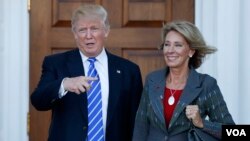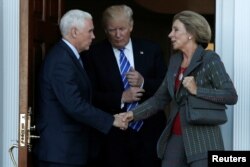Student Union
Secretary of Ed Pick Moves Closer to Confirmation

The nomination now goes to the full Senate for confirmation.
If confirmed, DeVos would oversee about 50.4 million students who attend about 100,000 public schools and 34,000 private schools. About 35 million students are in pre-kindergarten through eighth grade. About 15 million are in high school, or ninth through 12th grades.
Another 5 million students attend private elementary and secondary schools, according to the National Center for Education Statistics.
In her home state of Michigan, DeVos has advocated "school choice" and charter schools. That approach does not rely on children attending school in or near the neighborhoods where they live, which has traditionally been the model for U.S. public education. Instead, it advocates that children attend schools where the educational philosophy is compatible with the student's and parent's beliefs, such as same-gender or religious schools.
DeVos is a member of the Reformed Christian movement that has roots in Dutch religion and immigration. Michigan is home to the United States' largest number of Dutch-Americans, including the DeVos family.
The DeVos family built the Amway company, ranked as the 29th-largest American private business. Amway started as a cleaning supplies company in 1959 built on a direct-sales model. The company organizes a network of independent sellers and offers them sales incentives.
Education policy responsibilities
The education secretary oversees one of Washington's smaller agencies that "establishes policy for, administers and coordinates most federal assistance to education," according to the agency's website.
The Cabinet position also assists the president with education policy and legislation. The department's mission "is to serve America's students — to promote student achievement and preparation for global competitiveness by fostering educational excellence and ensuring equal access."
The U.S. Department of Education is relatively small (No. 16) compared with other agencies, such as Defense (No. 1), Justice (No. 4) or Transportation (No. 9). The department began in the mid-1800s as a way to collect statistics about American education.
But in the 1950s — relative to the post-World War II baby boom — it expanded. The department's "About Us" description points to the 1957 launch of the Soviet Union's Sputnik satellite as a driving force behind increased aid for U.S. science programs.
President Lyndon Johnson stepped up efforts in the 1960s by improving education for poor students. Those programs benefited racial minorities, women, the disabled and non-English speakers in gaining "equal access to education."
In 1980, the department was formally assembled into an agency and now has nearly 4,300 employees and a budget of about $60 billion, according to its website.
Politics and education policy
The U.S. Constitution mandates that states are responsible for primary and secondary education, or kindergarten through high school. Most of the funding for local public schools comes from state and local public taxes. The federal government adds about 8.3 percent more to the pot. The remainder of the funding for local education, about 8.9 percent, comes from private sources, primarily for private schools.
DeVos and her organization — the American Federation for Children — advocate for "school choice," or more federal funding to be channeled to private and charter schools.
Opinions about the department typically run along traditional political party lines: Democrats call for increased funding; Republicans call for decreased funding. Some politicians have suggested that the Department of Education be abolished, allowing the states to have more freedom to govern their schools.
Falling test scores in U.S. schools that show the country lagging behind other industrialized nations have caused consternation in recent years.
Some critics, educators and families have blamed programs such as the No Child Left Behind Act, signed into law by former President George W. Bush, and Common Core, an educational initiative promoted by software billionaires Bill and Melinda Gates.
Some educators take issue with DeVos, who lacks experience in the public school system, either as a student, parent, teacher or volunteer. DeVos is from a wealthy Christian family that wants to provide families with more flexibility in choosing a private education.
DeVos faltered at her confirmation hearing in Washington this week when questioned by Sen. Al Franken (D-MN) about the education metrics of "growth" vs. "proficiency." The former refers to assessing schools based on how much students learn over time. The latter refers to the number of students reaching goals.
The next education secretary will also need to address the issue of for-profit colleges and universities. Several agencies within the Obama administration investigated the efficacy and cost of for-profit schools.
The education business of President-elect Donald Trump — Trump University — settled out of court with the federal government after it was accused of not providing to students the education it had advertised. Other for-profit schools have come under similar fire.
Tuition for education at colleges and universities has multiplied in the past 35 years. Students and families lament that higher education has become too expensive and burdensome, while job opportunities and wages have lagged.
This story first appeared on VOANews.com.
What are your thoughts about the pick for Secretary of Education? Please leave a comment under this story and post on our Facebook, Twitter or Instagram!
See all News Updates of the Day
Trump administration opens antisemitism inquiries at 5 colleges, including Columbia and Berkeley

The Trump administration is opening new investigations into allegations of antisemitism at five U.S. universities including Columbia and the University of California, Berkeley, the Education Department announced Monday.
It's part of President Donald Trump's promise to take a tougher stance against campus antisemitism and deal out harsher penalties than the Biden administration, which settled a flurry of cases with universities in its final weeks. It comes the same day the Justice Department announced a new task force to root out antisemitism on college campuses.
In an order signed last week, Trump called for aggressive action to fight anti-Jewish bias on campuses, including the deportation of foreign students who have participated in pro-Palestinian protests.
Along with Columbia and Berkeley, the department is now investigating the University of Minnesota, Northwestern University and Portland State University. The cases were opened using the department's power to launch its own civil rights reviews, unlike the majority of investigations, which stem from complaints.
Messages seeking comment were left with all five universities.
A statement from the Education Department criticized colleges for tolerating antisemitism after Hamas' Oct. 7, 2023, attack on Israel and a wave of pro-Palestinian protests that followed. It also criticized the Biden administration for negotiating "toothless" resolutions that failed to hold schools accountable.
"Today, the Department is putting universities, colleges, and K-12 schools on notice: this administration will not tolerate continued institutional indifference to the wellbeing of Jewish students on American campuses," said Craig Trainor, the agency's acting assistant secretary for civil rights.
The department didn't provide details about the inquiries or how it decided which schools are being targeted. Presidents of Columbia and Northwestern were among those called to testify on Capitol Hill last year as Republicans sought accountability for allegations of antisemitism. The hearings contributed to the resignation of multiple university presidents, including Columbia's Minouche Shafik.
An October report from House Republicans accused Columbia of failing to punish pro-Palestinian students who took over a campus building, and it called Northwestern's negotiations with student protesters a "stunning capitulation."
House Republicans applauded the new investigations. Representative Tim Walberg, chair of the Education and Workforce Committee, said he was "glad that we finally have an administration who is taking action to protect Jewish students."
Trump's order also calls for a full review of antisemitism complaints filed with the Education Department since Oct. 7, 2023, including pending and resolved cases from the Biden administration. It encourages the Justice Department to take action to enforce civil rights laws.
Last week's order drew backlash from civil rights groups who said it violated First Amendment rights that protect political speech.
The new task force announced Monday includes the Justice and Education departments along with Health and Human Services.
"The Department takes seriously our responsibility to eradicate this hatred wherever it is found," said Leo Terrell, assistant attorney general for civil rights. "The Task Force to Combat Anti-Semitism is the first step in giving life to President Trump's renewed commitment to ending anti-Semitism in our schools."
- By VOA News
STEM, business top subjects for international students

The Times of India breaks down the most popular subjects for international students to study in the U.S.
STEM and business lead the pack. Read the full story here. (January 2025)
- By VOA News
Safety and visa difficulties among misconceptions about US colleges

U.S. News & World report addresses some of the misconceptions about U.S. colleges and universities, including the difficulty of getting a visa.
Read the full story here. (January 2025)
- By VOA News
Work opportunities help draw international students to US schools

US News & World Report details the three top factors in foreign students' decision to study in the U.S. They include research opportunities and the reputation of U.S. degrees. Read the full story here. (December 2024)
- By VOA News
British student talks about her culture shock in Ohio

A British student who did a year abroad at Bowling Green State University in Ohio talks about adjusting to life in America in a TikTok video, Newsweek magazine reports.
Among the biggest surprises? Portion sizes, jaywalking laws and dorm room beds.
Read the full story here. (December 2024)







